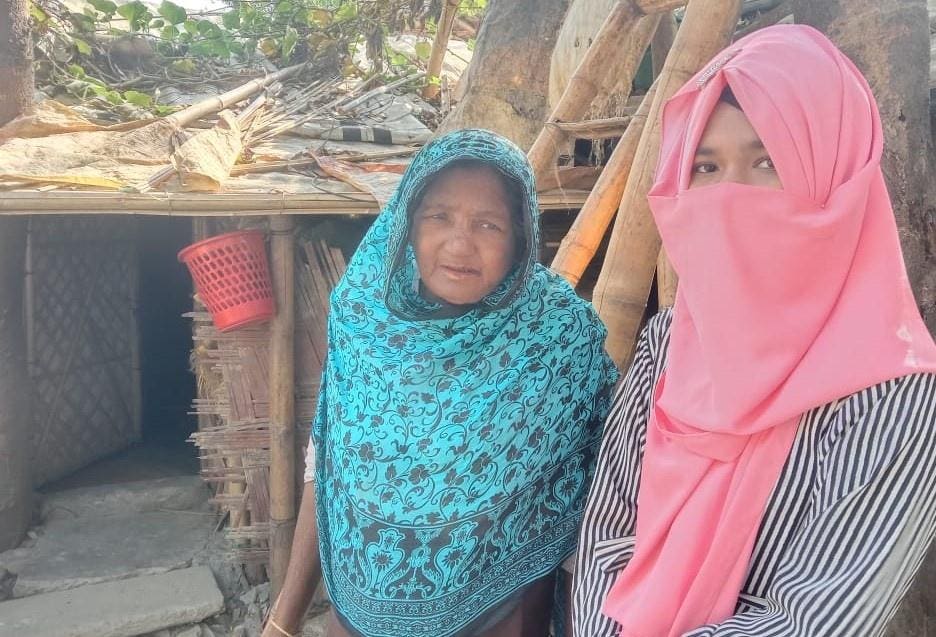Meet Roshida, a Rohingya orphan in Bangladesh who narrowly escaped child marriage to find new hope through education at a learning center supported by Education Cannot Wait and UNICEF.
By Kent Page
There are 1 million Rohingya refugees living in Bangladesh today. Chased out of Myanmar by a military-led campaign of brutal violence, they have lost their homes, fled through the night and seen family members murdered. In the world’s largest refugee camp in Cox’s Bazaar, sexual violence and exploitation, child labor, forced marriage and other grave human rights violations are commonplace. Living in densely packed, ramshackle houses of tin and cardboard, refugees fight for survival every day.
Amid the chaos — made worse by climate change-related flooding and natural disasters, fires, abuse, hunger and poverty — stories of determination, hope and opportunity are emerging. The story of Roshida, a Rohingya orphan girl who nearly lost everything when she entered puberty, offers unique insights into the daily challenges facing the Rohingya, and the power of education in building equality and human rights for one of the world’s most marginalized, stateless ethnic groups.
Roshida lost both her parents at an early age. When she was just a year old, her father died at sea in Myanmar. Two years later, her mother died in labor. She was alone — completely and totally alone, stateless, parentless, hopeless. Her grandmother took her in, but in 2017, they were forced out of Myanmar. Along with 700,000 other Rohingya refugees — more than half of whom are women and children — Roshida and her grandma escaped to Bangladesh.
After what must have been a harrowing journey, Roshida was finally able to start taking classes at a learning center supported by investment from Education Cannot Wait, the United Nations global fund for education in emergencies and protracted crises, and delivered by UNICEF and other partners in the refugee camps of Cox’s Bazar. Roshida dove into her studies, immersing herself in language, arts, math and science. She was a star student with big dreams.
As girls reach adolescence, the barriers to education increase
When Roshida entered puberty, her teachers noticed that she was missing classes. For girls living in this rough and unrelenting part of the world, there are a wide variety of gender-specific risks that must be endured on a near daily basis. Without proper menstrual health supplies, girls are often miss out on classes during their period. Even worse, cultural barriers, safety concerns and other factors often prevent girls from continuing with their studies.
It’s at this age that many families push girls into child marriage. Even worse, without a state or protection, some will be trafficked, raped, forced to work or sold into modern slavery. Roshida’s grandmother weighed the odds and decided to look for a husband for the 15-year-old girl.
“I don’t have long left to live. She needs a man who will take care of her. It’s time for her to get married,” said the grandmother, who was also worried about Roshida’s safety on the route to the learning center every morning.
A community volunteer from the learning center reached out to Roshida and her grandmother, building a systematic case for the girl’s return to school. The volunteer talked about the negative consequences of child marriage — early pregnancy, lost potential, lost dignity and lost agency in this world — and shared what an education could mean for a girl like Roshida: a chance to learn a profession, a chance to reach her full potential, a chance to break the cycle of poverty forever.
Keeping girls in school helps them realize their full potential
Roshida is not alone. Through ECW’s $30 million in investments to date, a variety of partners, including UNICEF, Plan International, Save the Children, UNESCO, BRAC, UNHCR and the Norwegian Refugee Council, are helping girls to stay in school, providing teachers and school officials with specialized training on gender inclusion and mental health and psychosocial support, and building classrooms, gender-segregated bathrooms and other holistic supports that keep children in school. To date, over 217,000 children have been reached, included 200,000 refugees. More than 140,000 children have received learning materials, 3,000 teachers have been trained and 650 classrooms built or rehabilitated.
Parent-teacher associations and school management committees — like the ones that kept Roshida in school — have been formed across the refugee camps and, as recovery from the COVID-19 pandemic continues, approximately 100,000 children have been able to continue their education through radio, TV and other remote learning opportunities. In all, close to 2,000 social workers and counsellors have been trained through the investment. This ensures girls and boys who have dealt with the life-threatening horrors of displacement are able to thrive even in these challenging circumstances.
With the help of volunteers who walk with Roshida to and from class every day, she is now regularly attending a girls-only class at the learning center. She just passed her exams, based on the Myanmar curriculum. For Roshida, the specter of child marriage is a thing of the past.
“I won’t get married before I turn 18,” Roshida says. “I see the challenges that the girls in my community face. If I get an education, I will teach them, and together we will create a more equal future.”
ECW is calling on global partners, philanthropic foundations and individuals to provide $1.5 billion in total funding over the next four years. With these expanded resources, ECW can support UNICEF and other strategic partners in reaching 20 million children with the hope and opportunity that a quality education provides.
Join ECW and UNICEF in supporting Roshida and crisis-affected children like her with your donation today. Your contribution can make a difference.
Read the full article here









